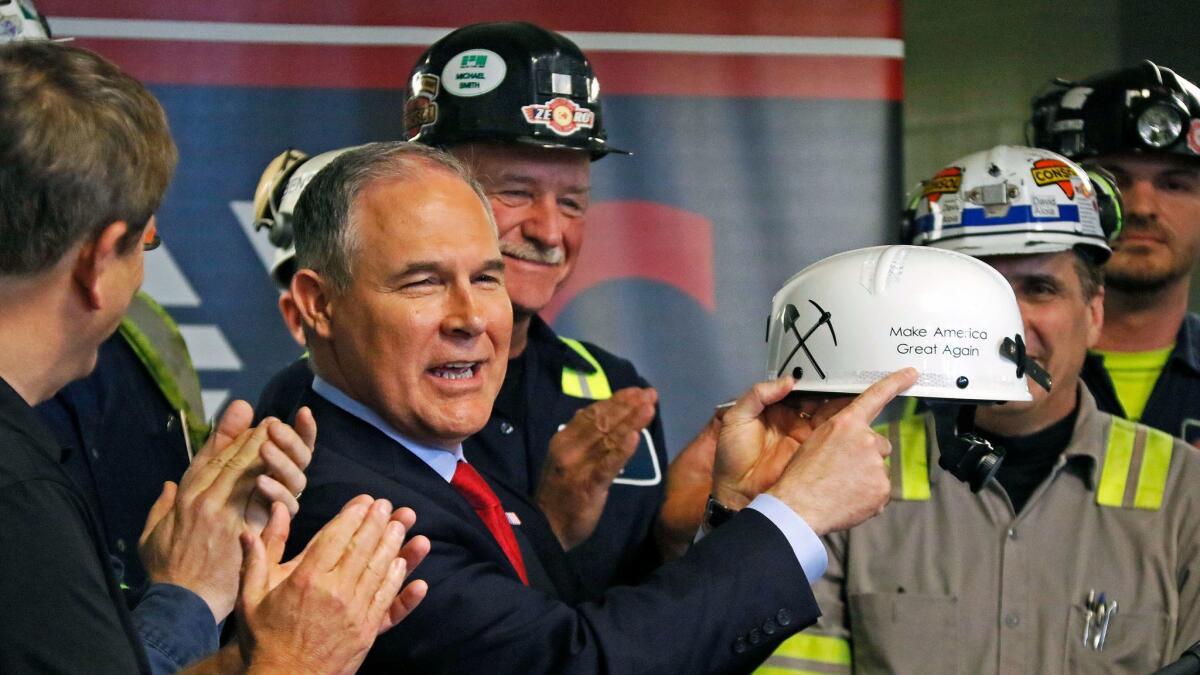Editorial: Goodbye science, hello industry

- Share via
Rigorous, independent research and analysis should undergird everything the government does. Nowhere is that more true than at the Environmental Protection Agency, which crafts and enforces a wide range of regulations aimed at limiting damage to the environment — and to people — from pollutants. Democratic administrations tend to use data to justify more aggressive regulation, while Republican administrations tend to prefer a lighter touch. But the current administration is following a third path, seemingly bent on converting the EPA into a science-be-damned rubber stamp for industry. And if director Scott Pruitt is successful, we will be living in a much more dangerous environment.
When his name first surfaced as President Trump’s pick to run the agency, critics complained that the president was putting a fox in charge of the henhouse. Pruitt has done nothing to dissuade the country that his critics were wrong. In his most recent move, he has decreed that academics and other scientists who hold research grants through the EPA cannot serve on long-standing panels that advise the EPA on the science upon which it bases its regulations.
These committees aren’t merely window-dressing; rather, their work carries considerable weight at the agency. The 45-member Scientific Advisory Board creates reports on the state of environmental science and assesses the EPA’s efforts to mitigate health and environmental impacts. The seven-member Clean Air Scientific Advisory Committee, mandated under the Clean Air Act, reviews the EPA’s work on air pollution. The 20-member Board of Scientific Counselors advises the agency on technical and management aspects of its research programs. Members of the boards are top researchers primarily from academia.
Pruitt has been a disaster for the EPA and the environment.
But Pruitt’s new ban, which he said is necessary to avoid conflicts of interest, would boot many of the academic researchers. It’s a stretch to argue that because the scientists conduct some of their research under EPA grants — won through competitive bids — that they can’t offer independent advice. There’s been no evidence of a problem with the boards, and it’s disingenuous to cook one up now as a pretext to removing independent minds from them.
Pruitt notably has issued no similar ban on people who work in industries facing regulation, where the conflict of interest is clear. Environmental and scientific critics infer, probably correctly, that Pruitt intends to invite more foxes to help him protect the chickens. Terry F. Yosie, who directed the Scientific Advisory Board in the Reagan administration (itself no friend of regulation), told the Washington Post that Pruitt’s move represents “a major purge of independent scientists and a decision to sideline the SAB from major EPA decision-making in the future.”
The new policy is in keeping with some of Pruitt’s other troubling moves at the EPA. Critics complain that he gives more time to industry voices than to his in-house experts or environmentalists (evidenced by his appointment calendar), operates under a cloak of secrecy (he’s installing a soundproof booth in his office and generally bars note-taking at meetings, which means less of a paper trail for decision-making). Last month, the EPA barred three of its scientists from making a climate change-related presentation at a science conference.
All of this is being done to undercut the operations of an agency that Pruitt spent years suing, and then was appointed to run. Pruitt signed off on a proposal to cut his own budget by nearly a third, and has aggressively worked to undo or undermine more than 50 rules and regulations promulgated primarily by the Obama administration. Contrary to the overwhelming consensus among scientists, Pruitt thinks global warming has little connection with human activity. By replacing academic researchers on his advisory panels with people tied to industry or those who share his disdain for science, he makes a mockery of the idea that science ought to be the result of independent inquiry, not ideology.
Pruitt is under investigation over his frequent trips home to Oklahoma using tax dollars and his occasional use of costly private planes and military aircraft. Whether that will affect his future at the EPA is unknown. But what is clear is that he has been a disaster for the agency and the environment. And this new move to clear the advisory panels of some of the nation’s most respected researchers in their fields is unconscionable.
Follow the Opinion section on Twitter @latimesopinion or Facebook
More to Read
A cure for the common opinion
Get thought-provoking perspectives with our weekly newsletter.
You may occasionally receive promotional content from the Los Angeles Times.






